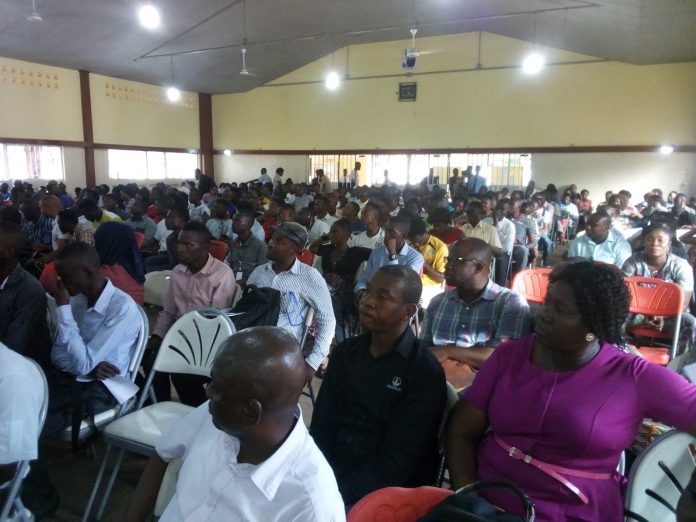The first Solade Adams Memorial Public Lectures was held on Wednesday 3rd April 2019 a the Milton Margai College of Education and Technology Polytechnic Great Hall, Goderich campus at which event the guest speaker, Dr. Victor Kabia articulated that the lecture is a brain-teasing analysis, that he is aware that his audience is made up of various learners including tutors and students and affirmed that the lecture would also create awareness about the successes and challenges in education.
Mr. Solade Adams was the first black and third Principal of the college from 1966-1980.
Dilating on the theme, ‘Means to an End: An Analytic Approach In Educational Practices,’ Dr. Kabia recalled that he was a student during the Principalship of the late Solade Adams in the 1970s, observed that the level of education in the country has changed dramatically but cautioned that we must cope with the environment we find ourselves, highlighted the benefits of the lectures and the factors that influence the means to an end, described psychology as any action to achieve the purpose to an end asserting that all factors in life are a means to an end and that education is to make students better citizens in society.
Dr. Kabia went on to enlighten that tutors/curriculum developers are faced with the problem of what to teach, that tutors must be committed to learners, recalled the recent massive failures in the country, the reason government established a commission of inquiry, underscored that teacher training is very important and continued that there are five points that affect education: what the learner brings to the learning environment, the learning environment itself, what is taught, the teaching and learning process and outcomes all of which are a means to an end.
“Teaching and learning is a team work. I have been involved in several efforts to reform the educational system in the country. To make good teachers, the authorities also have the opportunity to support teachers to give of their best. Also, over the past six years, girls have performed well than boys in the West Africa Examination Council and even in science subjects,” he asserted.
Dr. Kabia said a curriculum is the major aspect of learning and that learners must be involved in its development emphasizing that a syllabus is a smaller unit of a curriculum and underscored that a curriculum must be in line with the objectives of learning and observed that the means to learning is graduation.
He said other factors that affect education are the homes from which students come, the political will of the state, talents from God, that in some cases some learners refuse to accept teachers by refusing to learn for which he suggested the following:-that learners must acquire information, proffer logical reasons, present materials, that knowledge comes in units, that it is the duty of learners to be responsible and that both the learner and tutor must develop positive attitude.
Dr. Kabia furthered that the lethargy by students to read as well as organize and store materials are responsible for the massive failures in public examinations and warned that to study is not to memorize as the brain is like a store and went on, “anything could be taught no matter the state of the learner. The issue is the presentation that should be at the level of the learner.”
Among others, Dr. Kabia said a curriculum is divided into three:-knowledge, attitude and skills and lamented that examination malpractices are the road to a bleak future for the country reiterating that reading helps in communication, that students must learn to be competent and independent, have working skills and get results concluding that Sierra Leone needs a strong national educational system if quality education is to be achieved.
Earlier in his welcome address, the Acting Principal of the college, Dr. Philip John Kanu said the event is another milestone in the history of the college and recalled recently when the Chief Minister, Professor David Francis commissioned the Solade Adams Public Lectures but that since then they have been looking for a competent person to deliver the first lecture.
He said Dr. Victor Kabia is an outstanding academic with longstanding reputation and encouraged students to ask salient questions after the lecture.
The moderator of the event, Dr. Victor Massaquoi, Commissioner, Tertiary Education Commission, said the public lecture is part of the continuous assessment of students, affirmed that the administration wants the college to return to its past glory, that the event is part of the college’s activities and informed that one of the recommendations of the principal, his administration and the College Council is to organize public lectures to give students the opportunity to interact with lecturers and professionals and highlighted that someof the benefits of the lectures are to maximize thework of students, an opportunity to become academics as well as help them to learn and apply skills.
Mrs. Elizabeth Taylor-Morgan, who introduced the guest speaker, said he is an academic icon who started lecturing at the college in 1986 and has played several roles in the college and the country including serving as Head of Department-Education, Vice Principal, Acting Principal, Chairman of the college’s Academic Board and now Chairman of the Polytechnic Council.
Highlight of the public lecture was the question and answer session.
Subscribe
Login
0 Comments
Oldest




